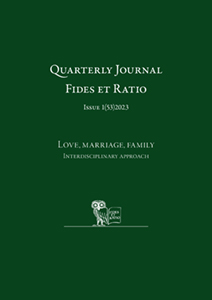Abstract
The aim of the article is an attempt to learn about the subjective experiences of mothers related to the impact of the pandemic on the essence of raising a child with communication disorders, in this case a deaf child and a child with autism spectrum disorder (ASD). Addressing this issue is important from the scientific point of view due to the important role of the process of bringing up a child and its perception by mothers of children with communication disorders. The article examines the role of the family, and addresses the deficit of empirical research and scientific studies on upbringing and parenting issues affecting mothers of children with communication disorders. The work uses the method of individual case study, as well as the technique of narrative interview and in-depth individual interview. Ten mothers participated in the study: five mothers of deaf children and five mothers of children with Autism Spectrum Disorder (ASD). The analysis revealed three significant areas indicated by mothers related to upbringing issues . The first area concerned upbringing as a process of supporting the development of their children, the second - the process of shaping desired social attitudes, and the third - dealing with threats caused by the COVID-19 pandemic.
References
Brown S., Schuman D. L. (2021). Suicide in the Time of COVID-19: A Perfect Storm. The Journal of Rural Health, 37(1), 211-214.
Cudak H. (1995). Szkice z badań nad rodziną. Kielce: Wyd. Wyższej Szkoły Pedagogicznej im. Jana Kochanowskiego.
Długosz P. (2021). Trauma pandemii COVID-19 w polskim społeczeństwie. Warszawa: CeDeWu Sp.z o.o.
Jan Paweł II (1989). Zasada wolności nauczania opiera się na godności osoby. Do uczestników zjazdu związku włoskich pracowników katolickich, 7 grudnia 1981. (W:) Jan Paweł II, Nauczanie papieskie, t. IV, z. 2, 389-391. Poznań: Wydawnictwo Pallottinum.
Kron F., W. (2012). Pedagogika. Kluczowe zagadnienia. Podręcznik akademicki. Sopot: Gdańskie Wydawnictwo Psychologiczne.
Kunowski S. (2004). Podstawy współczesnej pedagogiki. Warszawa: Wydawnictwo Salezjańskie.
Liberska H. (2021). Rozwój rodziny i rozwój w rodzinie. (W:)I. Janicka, H. Liberska (red.), Psychologia rodziny, 221-240. Warszawa: Wydawnictwo Naukowe PWN.
Liberska H., Matuszewska M. (2021). Modele funkcjonowania rodziny. Style wychowania. (W:) I. Janicka, H. Liberska (red.), Psychologia rodziny, 115-139. Warszawa: Wydawnictwo Naukowe PWN.
Okoń W. (1998). Nowy słownik pedagogiczny. Warszawa: Wydawnictwo Akademickie Żak.
Opozda, D. (2021). System rodzinny wobec sytuacji trudnej spowodowanej pandemią COVID-19- perspektywa pedagogiczna. (W:) A. Regulska, M. Czarniecka, A., J. Najda (red.), Rodzina i szkoła wobec pandemii COVID-19, 13-23. Toruń: Wydawnictwo Adam Marszałek.
Niedbalski, J. (2020). Macierzyństwo i ojcostwo w perspektywie podejmowania roli rodzica dziecka z niepełnosprawnością.Przegląd Socjologii Jakościowej, 16(3), 18-29.
Zasępa, E. (2018). Jakość życia rodziny a jakość życia młodych dorosłych z lekką niepełnosprawnością intelektualną.Psychologia Rozwojowa, 23(2), 67–84.

